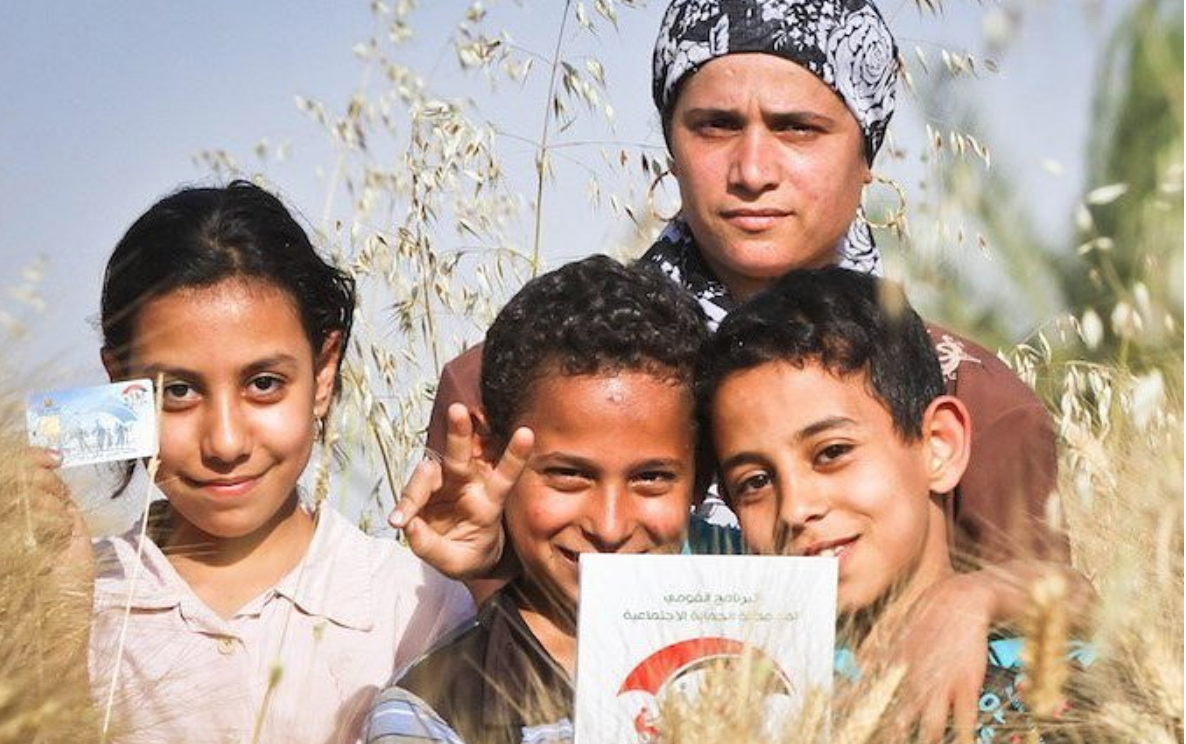In 2015, the Egyptian government implemented a series of major economic reforms, including ambitious antipoverty programs. To protect the poor and better target them for assistance, the Ministry of Social Solidarity (MOSS), with the support of the World Bank (WB), launched the “Takaful & Karama” Programme (TKP), Egypt’s first national conditional cash transfer (CCT) program. Takaful (Solidarity) targets poor households with children. Takaful transfers are given to women, and are conditional on school attendance and health monitoring (but the conditionality is not yet implemented). Meanwhile, Karama (Dignity) targets the elderly poor, people living with disabilities, and orphans.
Two years after TKP’s launch, IFPRI undertook a mixed-methods approach to assess its impact. First, a quantitative study was conducted, surveying nearly 8,000 households in most of the country’s governorates. A qualitative study followed, to enrich the quantitative results with additional information on the local context, and to study impacts on the poorest households (ultra-poor), which were not part of the quantitative study.
The evaluation study showed that Takaful transfers are being spent on improving the well-being of households, even before the conditions take effect. Recipients spend transfers on children’s education, including school supplies and school transportation; and on higher quality food, particularly fruits, meat and chicken. Takaful increased beneficiary households’ consumption by 8.4 percent compared to households not receiving the transfers; which is comparable to other successful CCT programs.
Yet these quantitative results likely underestimate the true impact of the program. Its effect on spending is expected to be even higher among ultra-poor households, for whom the transfers amount to a greater share of income. The qualitative study also found that transfers are being used for debt repayment and for purchasing on credit (factors the quantitative study did not capture).
The qualitative study showed that households are using the cash transfers to cover medical expenses otherwise covered by borrowing, and for private tutoring (helping to make up for the reported poor quality of public education and public health services).
Takaful also had a positive overall impact, reducing the probability of a household living in poverty by 11 percent. However, this impact is probably overestimated, since the study did not include the ultra-poor and focused on households just below the poverty line (US$1.90 per day).
Takaful also increased weight-for-height (WHZ) z-scores, which measures short term nutritional status, for children under 2.
The program had mixed results for women’s decision-making power. Quantitatively, it had a negative impact on women’s ability to influence decision-making. But during the qualitative study, women reported that receiving the transfers allowed them to decide (or contribute to the decision) on how to spend the transfers, even if they were not originally involved in household decisions. In addition, the qualitative study shed light on other forms of female empowerment, finding evidence of strengthening womens’ roles as mothers and managers of their households.
IFPRI also assessed Takaful’s targeting using a nationally representative sample of households with children. The assessment found that 67 percent of Takaful beneficiaries fall within the lowest two quintiles of households, based on their consumption levels, without the transfer. This exceeds the program’s original goal of 60 percent; however, a large proportion of households within the poorest quintile are not participating in the program, particularly in urban areas.
The evaluation also covered Karama, but the small sample size and a change made in the eligibility criteria during the study period prevented measurement of the program’s impacts.
A seminar held at the MOSS on Oct. 21 explored the evaluation results. Minister of Social Solidarity Ghada Waly recounted how the program started as an idea in 2008, following a pilot in Ain El-Sira, a slum area in Cairo. The pilot was inspired by the successes of CCT programs in Latin America. Scaling it up was a dream, and “years later, this dream became a reality,” Waly said.
Deputy Minister of Social Solidarity Nevine El-Kabbag presented the recent updates on the program’s implementation and coverage: TKP is now reaching 2.25 million beneficiaries, 87 percent under the Takaful program. This means that the program is covering around 9.4 million individuals, around three quarters of them in Upper Egypt. Next, a representative from Egypt’s national statistical bureau, the Central Agency for Public Mobilization and Statistics (CAPMAS), stressed the importance of making data available and accessible to researchers.
Matthew Smith, first secretary for economics and deputy head of programmes at the UK Embassy in Egypt—an evaluation partner, along with the World Bank—said that the program and the evaluation provide a sound example for other countries seeking to launch antipoverty programs. World Bank Advisor on Statistics and Research Dennis Nikitin stressed the importance of doing rigorous evaluations that reveal potential areas for improvement.
Clemens Breisinger, leader of IFPRI’s Egypt Strategy Support Program, emphasized the value-added benefits of having such a program in Egypt—protecting the poor over the short run and helping to build human capital over the longer term. He also highlighted the importance of research-based evidence for policy making, noting comments of Santiago Levy, the “mastermind” of Mexico’s Progresa/Opportunidades CCT program, that evaluation studies were a key factor for the project’s long-term success.
While initial evaluation shows promise, Cairo University Economics Professor Sherine El-Shawarby said, it is only a first step—the government should continue to monitor and assess the program’s effectiveness to build on initial successes.
Hoda El Enbaby is a Research Associate with IFPRI’s Egypt Strategy Support Program.







